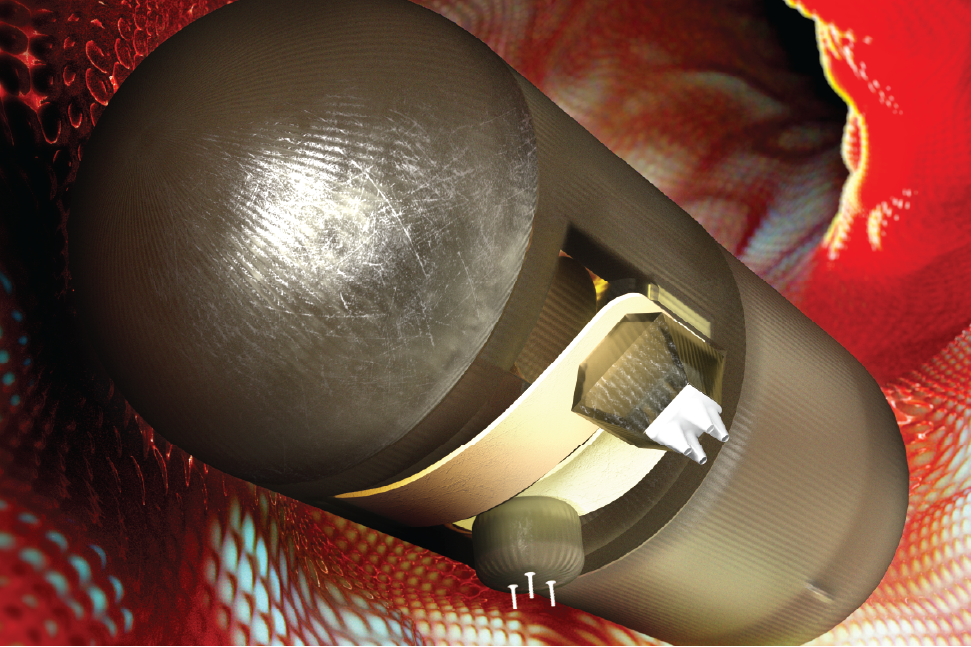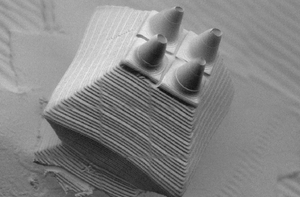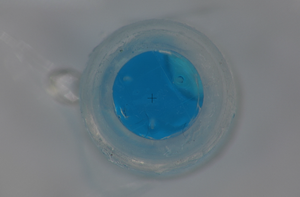
|
 |
Depiction of the developed ingestible capsule delivering the microinjectors to the GI tract for controlled drug delivery. |
|
Researchers at the University of Maryland (UMD) Institute for Systems Research (ISR) have further advanced their ingestible capsule. The device now features unprecedented control over drug delivery within the gastrointestinal (GI) tract. Their work is featured in a paper now published in the peer-reviewed journal ACS Applied Materials & Interfaces. “Microinjectors for Controlled Cross-Barrier Drug Delivery in the Gastrointestinal Tract” presents a 3D-printed capsule with integrated microneedles and a tunable drug reservoir, offering precise release times ranging from seconds to months. The team at the MEMS Sensors and Actuators Laboratory (MSAL), a lab led by UMD Distinguished University Professor Reza Ghodssi (ECE/ISR/Fischell Institute Fellow), has been working on advancing this technology.

Scanning electron microscope image of a flexible injector made using a hybrid fabrication process to allow sharp and effective injection needles.
“I am proud of my team for advancing the ingestible capsule technology to deliver medicine when and where it’s needed most,” said Dr. Ghodssi. “Thank you to ACS Applied Materials & Interfaces for featuring this work, which has the potential to greatly improve the lives of those living with GI tract conditions like Crohn’s disease and ulcerative colitis.”
The team used a hybrid 3D printing approach to fabricate the capsule so it could support large drug loading volumes and fine-scale delivery precision. The new approach was inspired by previous ingestible actuation technologies.
“This advancement is expected to drastically improve the control of localized drug therapy,” said first author Dr. Joshua Levy, a researcher in MSAL and an alumnus of ISR's doctoral program. “It will lead to meaningful improvements like fewer side effects and more effective treatments.

Diffusional release of model drug from a rigid injector for prolonged and controlled treatment of GI disease.
The paper represents the latest advancement in ISR's extensive body of work on ingestible diagnostic and therapeutic systems. Prior MSAL-led research has focused on real-time sensing for gut health monitoring, including wireless bioimpedance sensors and gas detection tools integrated into swallowable capsules.
This research was supported by the National Science Foundation, who recently featured it in the “Innovations in Medical Sensors” section of this article. The work was conducted in collaboration with colleagues in electrical engineering, materials science, and biomedical engineering. Dr. Ghodssi serves as MSAL's director and has guided much of the interdisciplinary effort behind these innovations.
The work exemplifies ISR's commitment to systems-level solutions in healthcare technology, combining design, fabrication, sensing, and actuation into integrated, patient-centered platforms.
Related Articles:
Ingestible device research advances, enters new phase
MSAL’s work on serotonin characterization and detection results in two journal covers
Abshire, Ernst receive MPower seed grant for using AI in understanding chronic pain biomarkers
Rapidly evolving ‘smart marble’ sensors hold promise for monitoring pharmaceutical industry bioreactors and beyond
University of Maryland Research is Redefining Health Care
Research Paper and Cover Art Now Feature Article in Journal
Ingestible Capsule Advances May Lead to Earlier Detection of Diseases
New features on ingestible capsule will deliver targeted drugs to better treat IBD, Crohn’s disease
Ingestible Capsule Technology Research on Front Cover of Journal
Gut Health Monitoring Gas Sensors Added to Ingestible Capsule Technology
June 26, 2025
|

